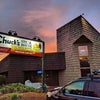Study: 'Smart' Infrastructure Key To New England Economic Growth
At 14.53 cents per kilowatt hour, Massachusetts is the fourth priciest state for electricity, behind New York, Connecticut and Hawaii, according to a study released last week that calls for a new way of thinking about infrastructure development in New England.
Three other New England states rank among the top 10 in energy costs, according to a study offered by the New England Council.
"Our biggest weakness is the energy cost, and the rest of North America is looking pretty happy at natural gas pricing," said Mike Reopel, a consultant at Deloitte, which helped write the study. He said, "We have a cul de sac in North America."
Natural gas pipelines end in New England, a region with few energy resources of its own. The study recommends the region maintain its nuclear power plants, develop natural gas infrastructure, and consider another liquefied natural gas terminal, which would provide backup capacity during peak demand, beyond the region's lone on-shore terminal in Everett.
The study recommends decreasing residential reliance on home heating oil to create more demand for natural gas and natural gas infrastructure development. It also calls for developing a regional consensus on renewable energy, including offshore wind power.
Technology is key, according to Reopel, and New England has an advantage in that area, with universities and community colleges linking skilled workers to jobs.
Transportation remains another hurdle in New England, especially in Massachusetts. The study cites a 2011 Texas Transportation Institute study, which found Boston to be the ninth worst metropolitan area in terms of hours lost per commute because of traffic congestion. That's a deficiency that could be hampering the economy, according to the study.
Paying By The Mile?
In the area of transportation, the study recommends "smart infrastructure" that measures a driver's use of roads, then charges them for that. One such proposal, a vehicle-miles traveled fee, has raised privacy concerns that the government could see where private individuals travel in their cars, but Reopel predicted the need to decongest roadways would make that idea more palatable.
"Those considerations wane over time," Reopel said. Speaking of traffic congestion's role in inspiring those kinds of solutions, Reopel said, "It has to come to a point where enough is enough."
Other studies have focused on public transit's role in lowering individual transportation costs, and congestion is not limited to Boston's roadways. According to a report released in June, the MBTA's aging infrastructure would be insufficient to handle a growth in ridership.
"Billions of dollars will need to be invested in new rolling stock and upgraded power and signal systems in order to address the capacity problems identified in this report," the Urban Land Institute report concluded.
The NEC study focused more on automotive, freight trains and airports, highlighting the benefits of Logan International Airport's recent non-stop connection to Japan. To reach emerging markets in India, China, and Brazil, travelers often have to move through New York, according to the study.
Noting the costs associated with developing a rail or subway system, the study recommended rapid bus transit to connect smaller cities. Reopel said bus transit, combined with pricing that would increase as congestion increased, would alleviate transportation woes.
Read more
Drop In Natural Gas Prices Highlights Start Of N.E. Heating Season
WPI Gets $4M For Energy Research
ThermoEnergy Team Gets DOE Award
UMass Med School Building Wins LEED Status









0 Comments